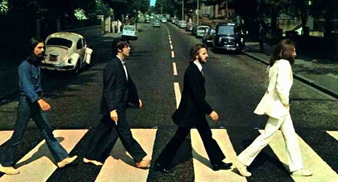On September 9, digitally remastered versions of all The Beatles studio albums will be released. You can read UNCUT’s verdict of the remasters in full in this month’s issue – on sale Thursday August 27. But, in the meantime, here’s extracts from David Cavanagh’s review to whet your appetite… The key word is clarity. Not loudness. Clarity. The voices and instruments are crystal clear, pure, human, natural (except, of course, when filtered through psychedelic effects) and stripped of several decades’ worth of detritus and dust. It’s as if we’ve been visiting an art gallery to gaze in wonder at a masterpiece all these years, and then suddenly an attendant comes along with a sponge and wipes the painting from top to bottom. The techniques of mastering have been controversial in recent years, with accusations (and proof, indeed) that music is being ‘brickwalled’: compressed to headache-inducing levels in order to give albums an ersatz loudness. Had these CDs come out in 1999 or 2000, as many of us were hollering for them to do, it’s likely they would now need remastering again. It’s a weird thing to say, but Apple’s frustrating procrastination has turned out to be a lifesaver for these albums. Remastered by a small team of Abbey Road engineers over a four-year period, the CDs have not been brickwalled or over-compressed (unlike the 2000 compilation 1, which sounds unpleasantly ‘glassy’ in comparison), and nor do they even sound particularly loud (unless you turn them up). The two that have been restored to the point of miraculousness and beyond, The White Album and Abbey Road, are the ones I’d recommend first to people on limited budgets. Abbey Road’s Long Medley is simply a breathtaking musical tapestry. When it has to rock, it rocks. When it needs to be subtle (there is much more to the transition between “You Never Give Your Money” and “Sun King” than we previously thought), it has a warm, heavenly glow. Of course, one could argue that any old rubbish would sound impressive on Abbey Road’s state-of-the-art, quintessentially expensive speakers. Perhaps we should all calm down a bit, chum. Will your so-called ‘clarity’ be detectable on a normal, high-street CD player, or on an iPod? It should, and it will. It’s not a question of surreptitious noise removal, or peak elimination, or making Magical Mystery Tour sound like Metallica (thank God). Think of it more as a spring-clean for the music and the mind. Changes in texture, atmosphere, the relationship of The Beatles’ voices to the microphone: all of these are evident and undeniable. As a result, almost every album comes as a shock. They haven’t had plastic surgery. They’ve taken their masks off, and we didn’t even know they were wearing one. History rewritten? No – history written honestly, truthfully, transparently, exhilaratingly, with no omissions or obfuscations. The Beatles up-close and personal. With blisters on their fingers.
On September 9, digitally remastered versions of all The Beatles studio albums will be released. You can read UNCUT’s verdict of the remasters in full in this month’s issue – on sale Thursday August 27. But, in the meantime, here’s extracts from David Cavanagh’s review to whet your appetite…
The key word is clarity. Not loudness. Clarity. The voices and instruments are crystal clear, pure, human, natural (except, of course, when filtered through psychedelic effects) and stripped of several decades’ worth of detritus and dust. It’s as if we’ve been visiting an art gallery to gaze in wonder at a masterpiece all these years, and then suddenly an attendant comes along with a sponge and wipes the painting from top to bottom. The techniques of mastering have been controversial in recent years, with accusations (and proof, indeed) that music is being ‘brickwalled’: compressed to headache-inducing levels in order to give albums an ersatz loudness. Had these CDs come out in 1999 or 2000, as many of us were hollering for them to do, it’s likely they would now need remastering again.
It’s a weird thing to say, but Apple’s frustrating procrastination has turned out to be a lifesaver for these albums. Remastered by a small team of Abbey Road engineers over a four-year period, the CDs have not been brickwalled or over-compressed (unlike the 2000 compilation 1, which sounds unpleasantly ‘glassy’ in comparison), and nor do they even sound particularly loud (unless you turn them up). The two that have been restored to the point of miraculousness and beyond, The White Album and Abbey Road, are the ones I’d recommend first to people on limited budgets. Abbey Road’s Long Medley is simply a breathtaking musical tapestry. When it has to rock, it rocks. When it needs to be subtle (there is much more to the transition between “You Never Give Your Money” and “Sun King” than we previously thought), it has a warm, heavenly glow.
Of course, one could argue that any old rubbish would sound impressive on Abbey Road’s state-of-the-art, quintessentially expensive speakers. Perhaps we should all calm down a bit, chum. Will your so-called ‘clarity’ be detectable on a normal, high-street CD player, or on an iPod? It should, and it will. It’s not a question of surreptitious noise removal, or peak elimination, or making Magical Mystery Tour sound like Metallica (thank God). Think of it more as a spring-clean for the music and the mind. Changes in texture, atmosphere, the relationship of The Beatles’ voices to the microphone: all of these are evident and undeniable. As a result, almost every album comes as a shock. They haven’t had plastic surgery. They’ve taken their masks off, and we didn’t even know they were wearing one.
History rewritten? No – history written honestly, truthfully, transparently, exhilaratingly, with no omissions or obfuscations. The Beatles up-close and personal. With blisters on their fingers.



